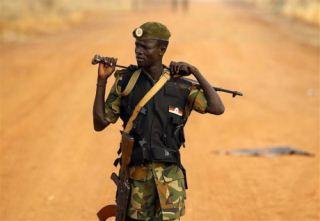South Sudan rebel faction abandons war against Juba
May 7,2012 (JUBA) – South Sudan announced on Monday that a group of rebels have abandoned their armed struggle and returned to the country’s capital Juba, apparently in a response to a presidential amnesty to all rebel groups.

A rebel militia of 215 men under the command of Major General John Dueth Yiech and Brigadier General James Duoth Lam are now part of the South Sudan army (SPLA) claims Juba .
Yiech said in a statement broadcast on South Sudan TV (SSTV) that he was ending his rebellion “voluntarily because we do not want to cause instability to our people and motherland”.
The SPLA’s spokesperson, Philip Aguer, said that the militias were sent by Khartoum to attack Kadar oil field but then decided to join the SPLA. He said the militia was met in Foluj, Upper Nile State.
Aguer further the move of the rebel leader “a blow” to Khartoum government which, according to the SPLA official lost “such a big number of troops and weapons.”
Sudan and South Sudan trade accusations of supporting and harboring rebel groups from both sides.
Khartoum says Juba support the SPLM-North and Darfur rebels who fight against the Sudanese troops in South Kordofan and Blue Nile.
A recent road map endorsed by the African Union and United Nations demand the two parties to stop backing rebel movements.
The group was received on Saturday by Brigadier General Malaak Ayuen and the commander of SPLA division one, Major General Jakuc Jul, commander of Paloge division six, Colonel John Yuel and two area commissioners.
Ayuen said 215 forces peacefully surrendered in a convoy of 11 open Toyota pick up trucks carrying different military equipments stressing it was provided by Khartoum to destabilise Juba..
“This is what we have telling the world, that Khartoum provides arms and trains militia groups to destabilise South Sudan. This has now been proved today as you can see and hear from them. This is no longer what the Government of South Sudan is saying. It is being proved,” Ayuen said.
The South Sudanese army explained they preferred to engage discussions with the rebels instead of fighting them and their peaceful approach was successful for both parties.
SPLA Colonel John Yuel said they received information about the presence of a rebel militia in the area and rather than launching a direct attack on them, decided to begin discussions. An agreement was reached on May 5.
Duoth said the rebellion had ended because they did not want to damage the nation’s oil infrastructure or road system.
He also claimed that the rebels had brought with them all what was given by the Government of Sudan in Khartoum and there are 500 members of the militia groups who have remained behind and expected to follow them.
He urged remaining rebels to join the SPLA.
Major General Duit Yiech was one of the SPLA commanders since the end of 1980s. He however defected and joined the Khartoum Peace Agreement of 1997.
When Riek Machar rejoined the SPLM/A in 2002 he did not rejoin with him. Instead, he remained with his new boss, Major General Gordon Koang Chol, who is also currently abroad and expected to rejoin the SPLA and his forces with Maj. Gen. Duit Yiech. Both were members of Anya-nya II even when Machar was still in the SPLM/A in 1980s before the split of 1991.
The announcement of the rebel defection came after statements by rebel leader, Tong Lual Ayat, to Sudan Tribune on Monday where he said he was in discussions with South Sudan’s vice-president, Riek Machar, regarding his troops being absorbed into the SPLA.
The leader of the rebel South Sudan People’s Liberation Movement/Army (SSPLM/A), has declared an end to his rebellion and joined the system in South Sudan.
Ayat said in a statement released Monday that his intention was to topple the government in Juba, which he accused of dictatorship.
Ayat said he will not rebel again but maintain his political party to participate in democratic changes in the new country.
Ayat was a member of the SPLA before forming the United Democratic Front in 2009. He formed the South Sudan People Liberation Army (SSPLA) in 2011. The SSPLA was in a coalition with fellow rebels, the South Sudan Liberation Army (SSLA) but relations broke down in February, with the SSLA claiming that Ayat is an agent of Juba.
The rebel SSLA confirmed in a statement put out on Monday that Ayat is no longer connected to them, accusing him of producing spurious information on behalf on Juba.
The rebel group also acknowledging the defection of James Duith Yiech and James Duoth Lam, but claiming it was a result of their being “replaced by young and educated officers who would safeguard the democratic revolution.”
This decision was a result of discussions by a coalition of rebel groups on the “political organ that would serve as basis of National Transitional Council”.
The statememt also denies Juba claims, saying only 130 troops defected. It is signed by Gordon Koang, head of South Sudan Defence Force; James Gai Yoach, head of SSLA; Johnson Olony, head of the South Sudan Democratic Army; Thomas Thiel, head of the National Democratic Front.
INTEGRATION OF ATHOR REBELS
South Sudan’s Vice President, Riek Machar, was briefed on Monday in his office by the committee for implementation of the agreement between the government and the South Sudan Democratic Movement/Army (SSDM/A).
The committee briefed Machar in the presence of the leader of the SSDM/A, Peter Kuol Chol, who succeeded late rebel leader George Athor Deng who was killed in December 2011.
The meeting discussed the importance of speeding up the process of reintegrating into the SPLA the SSDA forces from their various assembly points in Jonglei state.
SSDA forces are assembly in a number of different locations in Jonglei state and are concerned that the reintegration process has been very slow.
(ST)

